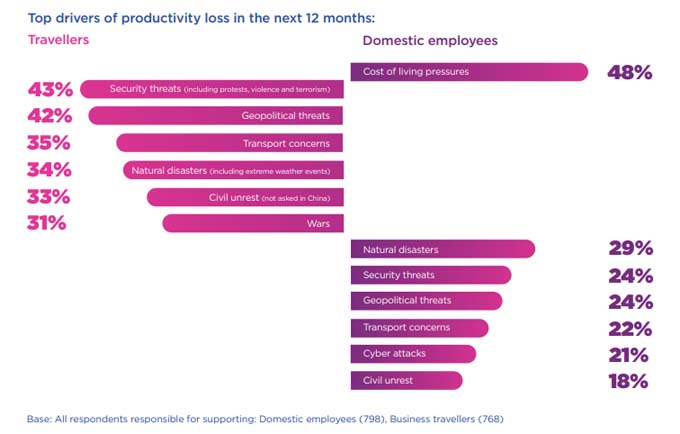Risk Outlook 2023: Companies enter permanent crisis mode
Geopolitical shifts and rising costs of living are putting companies in perpetual crisis mode. This is shown in the 2023 Risk Outlook from International SOS. For companies, this means, among other things, that they should increasingly use accurate and up-to-date information to help employees deal with rising costs of living, geopolitical risks and increasing unrest in some regions around the world.

Although the acute effects of the pandemic are subsiding in many countries, companies will continue to face significant risks worldwide in 2023. Experts predict that global risks have the potential to lower productivity levels as the cost-of-living crisis and challenging security situation impact employees. This is according to a new risk outlook, "Risk Outlook 2023," from International SOS and the updated world risk map "Risk Map highlight. These contain data on the medical and security environment of countries around the world with a rating from "insignificant" to "extreme.
Many of the findings for the 2023 Risk Outlook are based on a survey of 1218 senior employee health and safety professionals in 108 countries. From the DACH region, 108 experts participated. This provides a detailed overview of some of the biggest risks companies will face in 2023. In addition to existing issues, such as mental health, it shows that managers should support their employees in using accurate sources of information as they are affected by constantly changing events in the permanent crisis.
Risk Outlook 2023: The five forecasts from International SOS
Based on the results of the Risk Outlook survey, the Workforce Resilience Council and the organization's own data, International SOS has identified the top five trends that organizations need to be aware of in 2023:
- Importance of news/information in decision making: The influence of up-to-date, trustworthy, accurate, and actionable information or news on business decision-making continues to grow.
- Adapting to the "permanent crisis": Companies must adapt to a permanent crisis with geopolitical shifts, socioeconomic challenges and increasing polarization.
- Planning the unplannable - Business travel and overseas trips are slowly returning to their old levels, but are being done with far more caution and care. Business travelers want more support.
- Climate change and other events: Climate change or its consequences and other circumstances, such as epidemics and pandemics, increase health risks with far-reaching effects. A comprehensive approach is needed for companies to ensure employee health.
- The 'happy at work' equation (A+B+C)-D: This is the new equation for satisfaction at work. A new era has dawned in terms of mental health at work.

Consideration of the effects of geopolitical changes
The Russia/Ukraine conflict was the defining security issue in 2022, illustrating that geopolitics and the threat of interstate conflict are back on the corporate risk agenda. The conflict will certainly continue to have an impact in 2023. As a result, companies must learn to effectively manage the changing global risk environment. Geopolitical volatility will also spread beyond Russia/Ukraine over the next twelve months, as the growing rift between Russia and the West will impact other conflicts and exacerbate long-standing geopolitical tensions. In addition to the unmistakable divide between Russia and the West, competition between the U.S. and China will increasingly dominate the geopolitical and economic landscape. Best practices for companies are to continually review the likelihood and potential impact to elicit the potential consequences for their business and employees.
Many crisis management teams are currently learning to deal with a state of "perpetual crisis". In 2023, providing the right level of training, investment and support for these teams will be an important task for organizations, as experts have already pointed to high levels of crisis management fatigue. Managing this fatigue is key to moving from permanent crisis to crisis resilience. Companies that have effectively implemented lessons learned from the past two years benefit from more robust capabilities to manage challenges. Dealing with the permanent crisis in the right way is proving to be an extremely important issue: Numerous experts surveyed forecast that geopolitical trends will have a negative impact on productivity levels:

Increasing social unrest
The new Risk Outlook also shows how many of the experts surveyed believe social unrest will be a major cause of lost productivity in 2023. According to the report, 48 percent of respondents predict that cost-of-living pressures will impact domestic workers, and one-third (33 percent) expect unrest to affect business travelers. As a result, social unrest will be a major item on executives' agendas in 2023 - the problem is extremely multifaceted and impacts businesses and employees in many ways. Some issues and key points that executives should consider in this context are:
- Volatility in energy and agricultural markets will fuel unrest, especially in unstable, fragile economies. Regions most likely to be affected: Sub-Saharan Africa, Egypt, Lebanon.
- Lack of progress in resolving underlying economic or political problems will lead to growing public discontent as well as unrest, with the risk of violence growing over time. Regions most likely to be affected: Pakistan, Sri Lanka, Ecuador, Peru, Iraq.
- Polarization at the global level will translate into further domestic division, reinforcing existing triggers for social unrest and, in extreme cases, leading to increased localized violence and criminal activity. High-risk regions: USA, Western Europe.
Increasing impact of climate change
According to the Risk Outlook 2023, the effects of climate change - beyond the immediate consequences of extreme weather events - need to be considered at several levels. Companies should prepare for the potential increase in health risks associated with climate change. Experts point out that climate change is contributing to an acceleration in the emergence of new infectious diseases as well as the resurgence of old ones, as evidenced by the numerous "unusual" outbreaks of the 21st century. These include SARS, Ebola, COVID-19, and monkeypox. A report published in August 2022 in the scientific journal Nature Climate Change estimates that "more than half of known human pathogenic diseases may be exacerbated by climate change." It is believed that climate change will also lead to an increase in mosquito-borne diseases as temperatures and water levels rise. This situation could lead to outbreaks of malaria, dengue fever, and Zika virus in areas where these diseases have not yet occurred, and more frequent outbreaks in areas where they are already present.
These forecasts are even more important in light of the fact that, to date, only a quarter of organizations surveyed (25 percent) are actively preparing for future pandemics and COVID-19 variants. Best practices include conducting risk assessments of existing and potential health threats, incorporating projections for potential geographic expansion of threats due to climate change and other forces. Dr. Stefan Esser, Medical Director Central Europe at International SOS, comments, "Organizations are well versed in the response to the existing COVID-19 pandemic and should build on this existing knowledge. Crisis and business continuity plans need to be enhanced to address both known health risks and other potential health threats. Conducting emergency drills proves useful in this regard: these should include both likely and unlikely worst-case scenarios to ensure that responsible teams and employees are prepared."
Business travelers need more support in 2023
The 2023 Risk Outlook indicates that most companies (86 percent) will maintain or increase their budgets for travel risk management. Travel is expected to continue to increase and likely reach pre-pandemic levels. This trend is confirmed by data collected by International SOS. According to this data, international travel is currently 83 percent of pre-pandemic volumes. However, travelers are twice as likely to need advice or assistance. Business travel will clearly become more complex in the coming year, as companies must manage many issues in parallel. Encouragingly, experts predict that despite rising costs, travel management budgets will increase or stay the same in 2023. Investments of this kind will be crucial to ensuring the safety of business travelers in the coming year.
Source: International SOS









